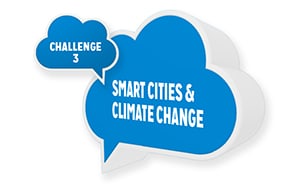 The ITU Telecom World Young Innovators Competition in partnership with the World Health Organization (WHO) is looking for innovative ideas on how information and communication technologies (ICTs) can help smart cities to slow down or mitigate the effects of climate change for the benefit of global health.
The ITU Telecom World Young Innovators Competition in partnership with the World Health Organization (WHO) is looking for innovative ideas on how information and communication technologies (ICTs) can help smart cities to slow down or mitigate the effects of climate change for the benefit of global health.
Extreme weather events, spread of epidemic and endemic diseases, threats to food and water security, air pollution increasing the burden of non-communicable diseases – climate disruption is compromising the health and well-being of people around the world.
Small island states, developing communities and those living around large cities are on the frontline, increasingly vulnerable to immediate and long term health risks as a direct result of global warming. There’s an urgent need to reduce human impact on the environment, focusing on preventative public health and a coordinated, multi-disciplinary and creative approach to mitigating the effects of climate change.
That’s where smart cities – and our latest Young Innovators Competition Challenge – come in.
Smart cities are focused on investing in human and social capital, transportation and communications infrastructure, and good management of natural resources to drive sustainable economic growth and high quality of life.
ICTs are the cornerstone of smart cities. By reducing emissions, improving environmental sustainability and using green technologies in innovative ways, smart cities can lead the way in improving public services in areas such as transportation, public spaces, education and, crucially, health.
The ITU Telecom World Young Innovators Competition Challenge on Smart Cities and Climate Change is held in partnership with the World Health Organization, who have long provided evidence, information and calls to action on the link between health and climate change, the topic of their upcoming Conference on Health and Climate Change, to be held on 27 – 29 August. Together we are looking for innovative ideas on using ICTs in smart cities to mitigate the effects of climate change and improve the health of the world’s citizens everywhere.
This might involve using cutting-edge technologies, or combining existing technologies, services and systems involved in smart cities. The focus may be on monitoring climate change or mitigating its impact on society; or on using technology to green our communities. Innovations may centre around physical devices such as smart grids, software such as big data analytics or services such as community education.
The scope of the challenge is wide. And the rewards are high – the chance to have your ideas presented at the WHO conference, and the opportunity for two winners to join us at ITU Telecom World 2014 in Doha, Qatar, from 7 – 10 December, where they’ll be able to pitch to industry andgovernment leaders, participate in development workshops and mentoring sessions, and win up to USD5 000 in seed funding.
We think the best way of working on concepts and ideas for new social start-ups which directly address climate change is by working together, through a process of co-creation. So this challenge comes in three parts, starting with the Ideation phase, where you can research, post ideas and discuss smart cities and climate change on our crowdsourcing platform, collaborating in a rich and multi-party creative process. Our expert-facilitators will guide your collaboration and provide direction and further ideas. In the Collaboration phase, the concepts identified as having the greatest potential will be refined and completed, ready for evaluation. And in the final Selection phase, the experts in our Selection Committee will determine the two winners joining us in Doha.
The challenge opens today, 8 August, and runs until 7 October. That’s two months to get thinking, discussing, creating and collaborating on concrete, innovative ways to reduce the negative impact of climate change on our health through smart city technologies. For the good of us all.
